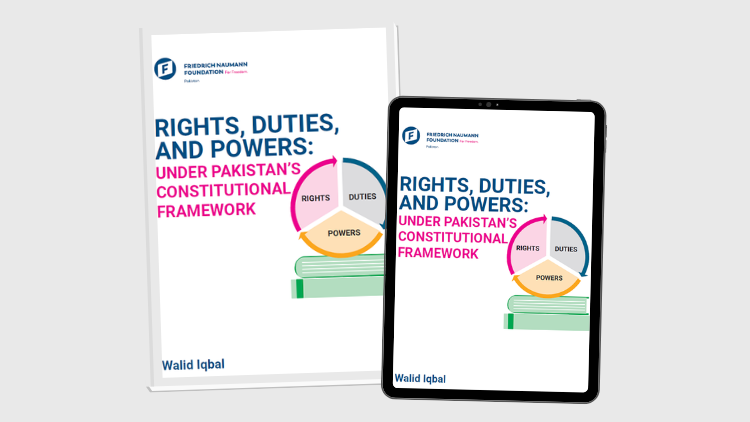Pakistan
Rights Duties And Powers: Under Pakistan's Constitutional Framework

A short guide to rights, obligations and powers as laid down in the Constitution of Pakistan
© Friedrich Naumann Foundation for Freedom - Pakistan"Over seven decades of Pakistan's history, and over almost five decades of the 1973 Constitution’s, the balance has mostly remained in favor of the first school of thought, manifesting itself either through direct military rule or through a political class groomed by the associated authoritarian mindset. Another manifestation of this has been the raft of amendments introduced by Generals Zia and Musharraf upon their restorations of the 1973 Constitution in 1985 and 2002 respectively, thereby transplanting overwhelming presidential powers into the realm of its parliamentary character.
This balance has been tipped somewhat to the other side by the 18th Constitutional Amendment, as it has restored the parliamentary system in full, and has devolved a range of powers to the provinces. But nearly thirteen years down the road, calls for reconsidering certain of the powers so devolved, and for giving a presidential form of government to Pakistan, are intensifying.
As posited by the 1973 Constitution at the very outset, speeding up the attainment of a robust democracy, acceptable to all shades of opinion, is the best way to overcome the aforesaid strain and tension – while sovereignty over the entire universe belongs to Almighty Allah alone, and authority to be exercised by the people of Pakistan within the limits prescribed by Him is a sacred trust, the State must exercise its powers and authority through the chosen representatives of the people. So it is best to let the people genuinely choose their representatives, let them complete their terms, and let them decide what scheme works best for Pakistan.
It might also be in order for Pakistan to undergo further and more authentic electoral reforms so that the election process is deemed transparent, and accusations of electoral fraud become minimal. Last but not least, political parties themselves need to adopt democracy and promote democratic values within their ranks, instead of indulging in dynastic rule or ganging up with unelected forces for measly gains. "